
| Centre Name: | 
Centre for Modern Languages and Literature (CMLL) |
| Chairperson: | Dr. Nadya Supian |
| Description of Centre: | Description of Centre:
The Centre for Modern Languages and Literature seeks to study and develop knowledge of the application of modern languages in society, media and discourse. It also aims to develop Malaysian literary works aimed at furthering our cultural and linguistic heritage.
Its mission is to:
|
| Research Area: |
|
| NO. | NAME | FACULTY | MEMBER |
|---|---|---|---|
| 1 | Angeline Wong Wei Wei | FCI | Associate Membership |
| 2 | Asha a/p M. Vanugopal | FCI | Full Membership |
| 3 | Carmen Nge Siew Mun | FCI | Full Membership |
| 4 | David Tneh Cheng Eng | FCI | Full Membership |
| 5 | Gheeta a/p Chandran | FAS | Full Membership |
| 6 | Foong Soon Seng | FAS | Full Membership |
| 7 | Indira Malani a/p Munusamy | FAS | Full Membership |
| 8 | Joanna Tan Tjin Ai | FAS | Full Membership |
| 9 | Josephine Anak Freni Affrin | FCI | Full Membership |
| 10 | Kayatri a/p Vasu | FCI | Full Membership |
| 11 | Krishnaveni a/p K.Subramaniam | FCI | Full Membership |
| 12 | Maxwell Sim Yik Seng | FCI | Full Membership |
| 13 | Nadya Supian | FCI | Full Membership |
| 14 | Norhaniza Binti Md Ismail | FCI | Full Membership |
| 15 | Paul Gnanaselvam a/l Pakirnathan | FAS | Full Membership |
| 16 | Sharon Chong Yee Ling | FCI | Full Membership |
| 17 | Swagata Sinha Roy | FCI | Full Membership |
| 18 | Thinusha a/p Selvaraj | FCI | Full Membership |
| 19 | Yee Sook Fen | FCI | Full Membership |
| 20 | Shu Bo Yue | FCI | Full Membership |
| 21 | Yip Chan Ling | FCI | Full Membership |
| 22 | Jamela Begam Binti Oli Muhamad | FCI | Full Membership |
| No. | Date | Event |
|---|---|---|
| 1 | 8-Jan-19 | Consultancy by Foong Soon Seng & Raphael Thoo Yi Xian as Facilitators for Cultural Learning and Exploration Trip (Manuel S. Enverga University at UTAR (Kampar Campus) |
| 2 | 26-Feb-19 | Talk on Multidisciplinary Research for the Humanities in the Digital Age: Trends and Challenges by Prof Dr Zuraidah Mohd Don from University of Malaya (UM) in KB 210, in collaboration with the Department of Modern Languages under the Faculty of Creative Industries |
| 3 | 25-Mar-19 | Presentation titled 'A Study of the Orcs in JRR Tolkien's The Lord of the Rings'by Dr. David Tneh at the International Islamic University, in conjunction with Tolkien Day, organised by International Institute of Advanced Islamic Studies (IAIS) Malaysia). |
| 4 | 28-Mar-19 | Talk on "Let's Speak English lah...not Manglish" for the Early Childhood Department by Dr Swagata Sinha Roy in Faculty of Creative Industries |
| 5 | 25-May-19 | Panel Discussion of A Dialogue on Arts Education by Dr. Carmen Nge at A+ Works of Art, d6 Trade Centre, Sentul, KL. |
| 6 | 1 - 2 July 2019 | Group Consultancy led by Dr. David Tneh for "TECO 2019: Redefining Reality AR and VR between UTAR-TECO". A FCI collaboration with Taipei Economic Cultural Office held at UTAR MPH Hall. |
| 7 | 3-Jul-19 | Talk on "Statistics in Language and Educational Research" by Dr Vahid Nimehchisalem KB210 |
| 8 | 17-Jul-19 | ENGLISH DAY Competition of language activities organized by CMLL & DML, held at UTAR MPH |
| 9 | 20-Jul-19 | Workshop on "Know your rights! Freedom of expression in the arts" co-moderated by Dr. Carmen Nge, held at Five Arts Centre, KL Event organized by Five Arts Centre. |
| 10 | 21-Jul-19 | Focus Group Meeting with Stakeholders on MOE Policy Proposal for Arts Education, presented by Dr. Carmen Nge at the Five Arts Centre, KL |
| 11 | 27-Jul-19 | Panel Discussion on "Interrogating the Political through the Arts", moderated by Dr. Carmen Nge at Ilham Gallery, KL Event organized by Five Arts Centre. |
| 12 | 19-Aug-19 | PUBLIC LECTURE on "Good and Poor Literature Review" by Prof Dr. Supyan Hussin at UTAR MPH |
| 13 | 13-Nov-19 | Mini Workshop on "Making Health Science Education fun with Games, VR and AR applications", participated by Dr. Carmen Nge in collaboration with the Department of Physiology, Faculty of Medicine, University Malaya. Event organized by The Malaysian Society of Pharmacology and Physiology (MSPP) as part of their MSPP teachers' refresher course |
| 14 | 7-Dec-19 | Artist Dialogue on the Solo Exhibition by Gan Siong King, moderated by Dr. Carmen Nge at A+ Works of Art Gallery, Sentul, KL Event organized by A+ Works of Art. |
| No. | Date | |
|---|---|---|
| 1 | Multidisciplinary Research for the Humanities in the Digital Age: Trends and Challenges, 26 February 2019 Prof. Zuraidah Mohd Don (UM) gave a talk titled “Multidisciplinary Research for the Humanities in the Digital Age: Trends and Challenges” on 26th February 2019 in KB 201 UTAR Sg Long campus. In her very engaging talk, she highlighted the concept of multidisciplinary research, and explained how the humanities can contribute to multidisplinary research, as well as how technology can contribute to the Humanities. She explained that a multidisciplinary team works in a team with members using their own expertise to solve real-world problems from each of their perspectives in the pursuit of a common goal. They collaborate and make complementary contributions, but work within their own discipline. In multidisciplinary research, the research problem is defined using different paradigms or different o related questions. The research style is parallel and the output is usually separate publications by participants from each discipline. The talk also highlighted different challenges when pursuing multidisciplinary research. One was a lack of a “common language” among the researchers, making it difficult to discuss ideas with team members and getting the right feedback. It was also possible that this could lead to a lack of meaningful criticism and evaluation of one’s work, where ideas and suggestions could either be accepted without any questions or rejected without constructive criticism. Furthermore there could also be problems with technical and administrative issues that impeded the research progress. Lastly, she emphasized that humanities research places focus on the human being, on human cultures and encounters between cultures and people. The Humanities World Report 2015 proposes a classification of nine value categories, which it names as intrinsic value, social value, cultural heritage, economic value, innovation, critical thinking, contribution to other disciplines, personal and spiritual development, and aesthetic appreciation. Thus, in a world increasingly shaped by and dependent on technology, humanities research will be more multidisciplinary than ever before. |
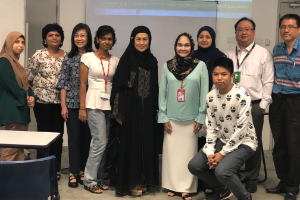
|
| 2 | Talk on “Let's Speak English lah...not Manglish”, 29 March 2019 Dr. Swagata Sinha Roy, senior lecturer from the Department of Modern Languages, representing the the Centre for Modern Languages & Literature delivered a talk titled “Let's Speak English lah...not Manglish” on for students from the Early Childhood Programme in the Faculty of Creative Industries at the UTAR Sungai Long campus. The talk was aimed at encouraging the speaking of standard English, especially in classroom situations and when conversing with parents. Dr Swagata stressed on the importance on learning the differences that lie in intonation and pronunciation of words and explained that miscommunication can occur when words are not pronounced correctly. She held an interactive session with students to demonstrate the difference between pronunciation of words in standard English and Manglish. The students learned about pronunciation during the talk and gave positive feedback on the activities. |
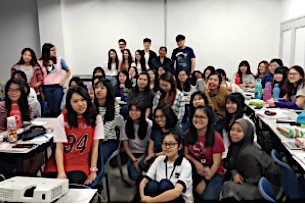
|
| 3 | “Talk on Statistics in Language and Educational Research”, 3 July 2019 Dr Vahid Nimehchisalem, senior lecturer from the Department of English Language of Faculty of Modern Languages and Communication, Universiti Putra Malaysia delivered an interactive talk titled “Statistics in Language and Educational Research” on 3 July 2019 at UTAR Sungai Long Campus. The talk was organised by the Centre for Modern Languages and Literature (CMLL) in collaboration with Department of Modern Languages (DML), Faculty of Creative Industries (FCI). In his talk, Dr Vahid presented the significance of statistical skills in conducting high impact research to the audience. “Statistics is a tool for making predictions and generalisable decisions. The statistical skills that you own will help you to better understand the literature, collect data, and analyse and interpret research results more confidently,” said Dr Vahid. “Most of us find quantitative research difficult. Do not just try qualitative, go for quantitative by going to workshops and learning to apply it in your research; you should learn to use both of them,” Dr Vahid added. His presentation covered descriptive versus inferential statistics, parametric versus nonparametric statistical methods and common statistical misconceptions. Dr Vahid explained how sampling works in research and elaborated on common errors made by researchers when selecting samples. He discussed common statistical misconceptions such as the preference for larger sample sizes among researchers; and reminded participants that the data collected should be processed first prior to running any form of statistical analysis. He emphasised that sample size is relative to the issue being studied, and gave two studies as examples. The first study was on the impact of how consumption of cocoa impacts diabetes in rats, in which a sample size of 5 rats was deemed sufficient. The second study was a study on anxiety that required a larger sample of the population. “Research means development; the reason why R&D comes together. The more research you do, the more developed you will be. Research to me is the difference between confidence and, the lack of confidence,” Dr Vahid said. The talk concluded with a Q&A session between Dr Vahid and the participants who asked various questions on statistical analysis and raised issues related to research. |
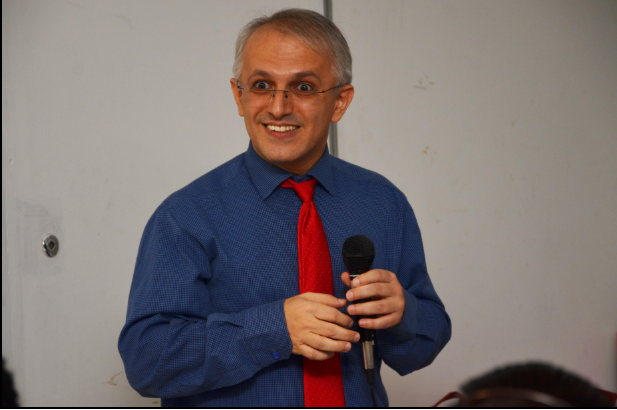
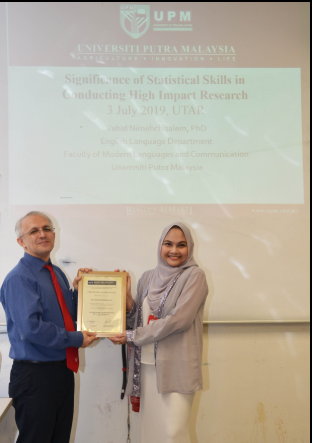
|
| 4 | “English Day 2019”, 17 July 2019 “English Day 2019” was organised by the Faculty of Creative Industries (FCI) Department of Modern Languages in collaboration with Centre for Modern Languages and Literature (CMLL) and Sungai Long Campus Drama and Public Speaking Society on 17 July 2019 at UTAR Sungai Long Campus. A public speaking competition was held in conjunction with the event. It was modelled on the Toastmaster’s public speaking style which has been the main highlight of the event. The event saw the presence of FCI Acting Dean Thinavan Periyayya, Faculty of Accountancy and Management Dean Dr Sia Bee Chuan, FCI Head of Department of Modern Languages Maxwell Sim Yik Seng, UTAR staff and students. It also witnessed the presence of 26 delegates from Guangxi University, China. Invited to be the judges for the public speaking competition were Chief Judge Zachary Roland A.F. Anthony, Anthony Gandolfo Miranti Jr and Saraswathy Thurairaj. Thinavan encouraged the audience to speak the English language more often to build self-confidence. “When I was young, there were a few things that my teacher taught me to do every day to improve my English; learn five words per day, write five sentences based on the words that I have learnt and figure out its grammar, write a new sentence for each word and use it with my friends. As an outcome, I managed to win the first prize in a contest. Merely attending English classes alone will not really to improve your language but you must go beyond that, you need to read and write as much as possible.” Maxwell Sim said in his welcome remarks, “Public speaking is an important skill that we have to equip ourselves with. It is not only important for your study but it is also important when you step into the working industry. Public speaking skills enable one to convey their message effectively. Besides, it is also important to have a good presentation skill to persuade people about your products and services. This may also help to build self-credibility through your presentation.” The competition saw 13 participants taking part in public speaking. Each participant was given two minutes to present the topic “Beauty lies in the eyes of the beholder” and one minute for the judges to evaluate the participant. The champion of the competition walked away with RM300, while the first, second, third and fourth runners-up walked away with RM200, RM150, RM100 and RM50 respectively. Besides, all participants received a certificate of participation. The result of the competition is as follows: Champion : Syamini Syazwani Devi Muraleidaran First Runner-up : Chee Choon Cheng Second Runner-up : Deneshwaran Raj Seeralan Third Runner-up : Gina Grindyl Philip Fourth Runner-up : Pang Wiyett When asked, the Champion of the Public Speaking Competition Syamini said, “This is my first time participating in a public speaking competition. I felt shocked and surprised when they announced the Champion because I wasn’t sure if I was going to win.” She then continued, “In my opinion, public speaking is very relevant especially for our studies because every semester we have assignment presentation. If we keep improving ourselves in public speaking, it will help to build our self-confidence. Moreover, public speaking is also important for our future. We need to know how to speak to our clients and sell our products or services to them. I would encourage my juniors to participate in this competition because it is important for them to learn to speak in front of people.” |
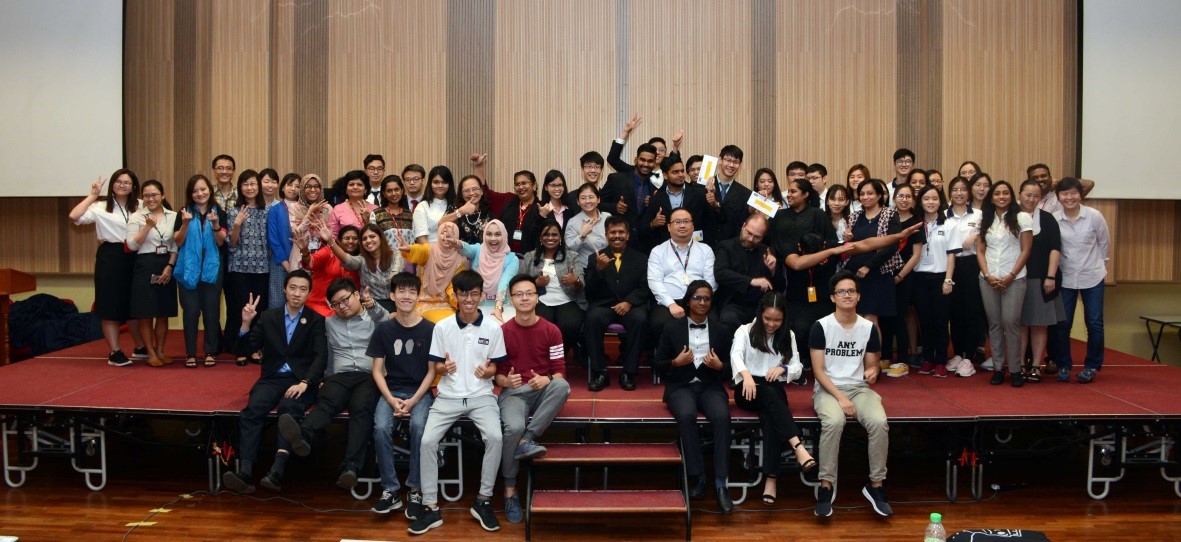

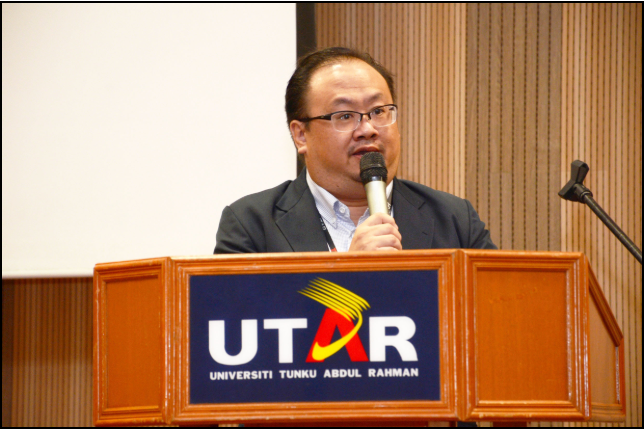




|
| 5 | “English Day 2019”, 17 July 2019 The Director of Institute of the Malay World and Civilization (ATMA) of University Kebangsaan Malaysia (UKM) Prof Dr Supyan Hussin was invited to give a talk titled “Good and Bad Literature Reviews”. This talk was held on 19 August 2019 at UTAR Sungai Long Campus. It was jointly organised by the Centre for Modern Languages and Literature (CMLL), and Faculty of Creative Industries’ Department of Modern Languages (DML). Dr Supyan began the talk by elucidating the reasons for writing a literature review. Next, he explained the key points of a literature review. The four elements of a good literature review include using correct structure, format, content and language. He also provided the sources of reference and shared about his previous researches that were undertaken in the recent five years. Dr Supyan also taught participants the effective ways of writing a critical literature review using a flow chart. “Literature review is not a summary of the past studies, but an assessment and critical review of the past studies,” he said. He then pointed out 11 things bear in mind when writing a literature review. It included extracting main points or key issues from the textbook/article, summarising the main points, examining the theoretical framework used in the studies, looking for instruments used, taking note of how the data was collected and analysed, finding suitable quotes to be used the literature review, tracking all bibliographic information, using quotation marks and citing the page number (when you copied the author’s words directly), stating the purpose of the author’s statement, stating the conclusions that the author made and finding points to supports the conclusion. He also gave four useful links to obtain good literature review tips to the participants. The talk continued with Dr Supyan explaining the differences between theoretical and conceptual frameworks. He then presented an example of a critical literature review in English and Malay as references. He advised the participants to avoid starting a paragraph with a quote as it is best to start with one’s own voice or ideas. “Always start with your own voice and a topic sentence to support your points,” Dr Supyan said. He also cautioned the participants to not overcite every sentence as it shows the absence of one’s own voice. “A good, critical literature review is the key to successful research,” he said. The talk was very well received by the attendees, with requests for the floor for more similar events to be organised in the future. |
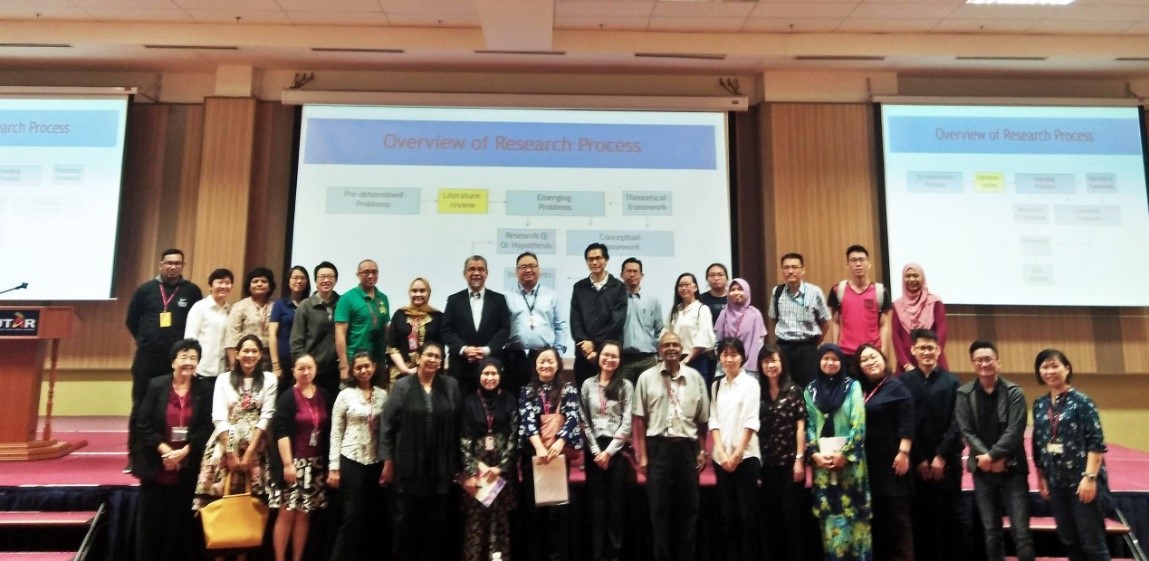
|